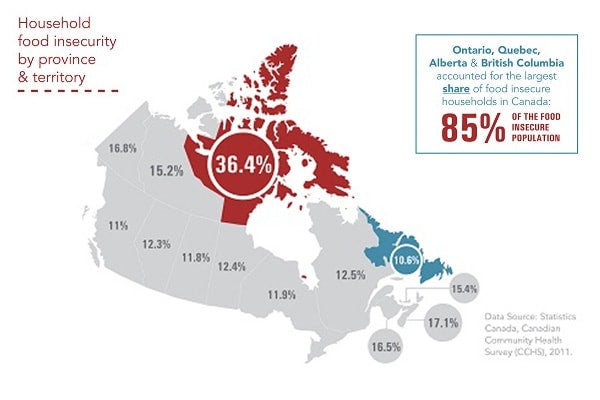
Almost 4 million Canadians struggle to afford food
Published: July 25, 2013
A new report by researchers at the University of Toronto shows that almost four million Canadians are struggling to put the food they need on the table because of food insecurity.
“The impact of this situation on children, families, communities, the health care system and our economy cannot be overstated,” said Dr. Valerie Tarasuk, a nutritional sciences professor at U of T’s Faculty of Medicine and principal investigator for PROOF, an international team of researchers committed to the reduction of household food insecurity.
The report, which examined the state of food insecurity in Canada, states that 3.9 million Canadians struggled to afford enough food in 2011, an increase of close to half a million compared with 2008. Of those that went hungry in 2011, 1.1 million were children.
Food insecurity is the inadequate or insecure access to nutritious, healthy food because of financial constraints. For those affected, the consequences can include physical and emotional hardships, as well as the associated compromises to their health and well-being.
The report was prepared by PROOF, a Canadian Institutes of Health Research (CIHR)-funded research program initiated to identify effective policy interventions to address household food insecurity. The project was led by Dr. Tarasuk, who said the findings should be a wakeup call for government.
“The problem is not under control and more effective responses are urgently needed," Tarasuk said. "The cost of inaction is simply too high.”
Some key points from the report include:
- Nearly one in eight Canadian households experienced food insecurity in 2011.
- With the exception of Newfoundland and Labrador, food insecurity has persisted or grown in every province and territory since 2005.
- One in six children in Canada lived in a household affected by food insecurity in 2011.
- Nunavut, Prince Edward Island and New Brunswick had the highest prevalence of children living in food insecure households at 57%, 27% and 25% respectively.
Until now, the main window into the problem of food insecurity has been food bank utilization statistics. However, the report’s findings show that extent and distribution of food insecurity is far greater than food bank use indicates.
Future PROOF work will explore data on the linkages between the incidence of food insecurity and trajectory of chronic disease, as well as the long-term impact on child development.
“Our findings uncover the harsh reality of inadequate access to food," Tarasuk said. "PROOF will continue to gather detailed information on the nature, extent, and human and economic cost of food insecurity. By arming ourselves with the right data, we will be able to develop achievable solutions to ensure the health and well-being of all Canadians."
Suniya Kukaswadia is a writer with the Faculty of Medicine at the University of Toronto.



